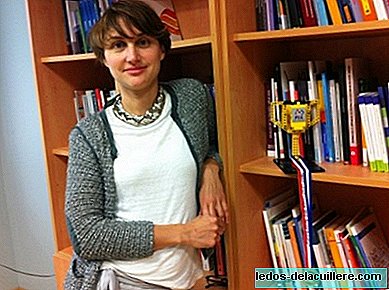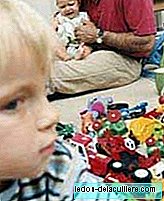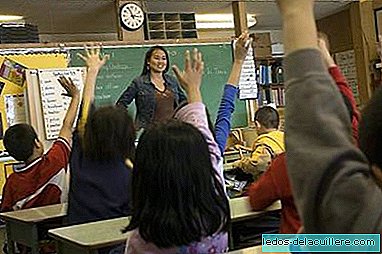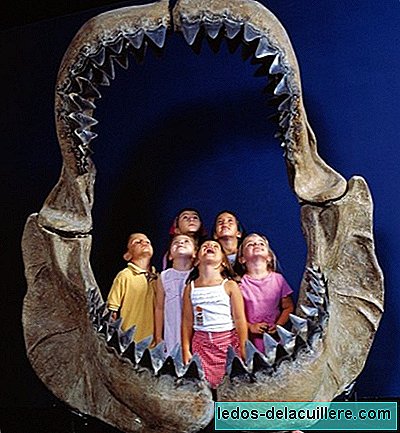
Ainara Zubillaga del Río is Vice Chancellor for Innovation at the Camilo José Cela University (UCJC), is specialized in educational innovation and in the promotion of entrepreneurship. Its mission is to promote educational research as a tool for innovation and teacher transformation. He also works collaboratively and cooperatively between the UCJC and the SEK Colleges. We met Ainara when we were at the Camilo José Cela University at the end of February 2013 in the Junior First Lego League 2013 competition. We took the opportunity to chat with her and asked for an interview to explain the UCJC's participation in the First Lego League and many more initiatives promoted and directed by Ainara at the University.
What activities are carried out from the Innovation Department of the Vice Rectorate of the UCJC
The Vice President for Innovation of the UCJC acts on different fronts. On the one hand, the development of educational innovation and entrepreneurship within the University, as well as the impulse of educational research, understood as an instrument at the service of innovation. That is, with the objective set to improve teaching practice. On the other hand, the articulation of innovation initiatives that energize the Campus and university life (the First Lego League Tournament would be included in this area). The attention to diversity constitutes another of the pillars of action of the Vice-Rectorate. Addressing diversity implies providing different solutions or approaches to the same problem or situation; The needs generated by and from diversity represent an opportunity for us to promote innovative practices, processes or products.
Finally, and as part of the SEK Educational Institution, articulate channels of collaboration between schools and the university. The contact with the daily educational reality of the SEK centers provides us with a constant source of initiatives and good practices, while our research work in the university has a positive impact on the validation of the educational innovations that the centers develop.
What tasks have you had to do with the First Lego League
The organization of the First Lego League Tournament involves several tasks. The first one is the acquisition of equipment. The teams are the center of the tournament and to achieve their participation we have made numerous visits to educational centers explaining what it is to participate in this experience, and what it brings from the educational and personal perspective to the children and youth who are involved in it. The other great pillar of the Tournament is the volunteers. Without them, this would not be possible, so the recruitment and training of volunteers would be another of the main tasks.
As an educational institution, we wanted to give special relevance to the field of scientific education, and offer different actions that will help and provide resources to the teams for the elaboration of their Scientific Project (in this year's challenge, Vitalia's collaboration in this regard has It was fundamental because they have opened the doors of their centers and has given training to the teams).
The recruitment of sponsors is another task. These sponsors invest in the organization of the event, which would be the last of the great tare blocks and which in turn involves numerous actions: audiovisual media, assembly, attention for teams, organization of volunteers, communication and dissemination, etc.
What has been the experience of UCJC's participation in the First Lego League
Participation could not be more positive. We have received numerous congratulations from teams, coaches and volunteers, and we are delighted with the response of the people and the climate of teamwork and collaboration that has been generated thanks to the Tournament. In addition, organizing the Jr. First Lego League has been the icing on the cake: see the illusion and degree of involvement of the little ones - children between 6 and 9 years old - and their families, that of the teachers, as well as the level , work capacity and quality of the works presented, shows us that we have guaranteed quarry for the coming years.
What lessons give students a competition like the First Lego League
From a more academic perspective, it is an experience of formidable scientific and technological education. The teams face a challenge, which they must approach and solve from the scientific method. With the design and competition of robot, not only the technological field, but the problem-solving competition come into play. In short, a door to the scientific and technological field and an awakening of scientific vocations.
But the interesting thing about this experience is that in addition to the academic dimension, the development of transversal skills and values is fundamental.
Skills such as public speaking, the ability to organize and present conclusions and projects, teamwork, conflict resolution, respect for themselves and others, or the promotion of entrepreneurship, are present in this experience at the same level as the development of the scientific project or the design of the robot.
On the other hand, we should also highlight the international dimension of the competition and the opportunity for teams to be able to qualify for European and international competitions, and relate and know the work of teams from different countries.
What has been the contribution of the CSIC with the program "The CSIC in the school"
The CSIC team has participated in Jr. FLL, forming the group of what we call Collaborating Scientists. The format of the tournament among the little ones is not competitive, and the judges are replaced by the figure of “collaborating scientists”. Its function is to listen to the presentation of the projects, ask them questions about them, and offer suggestions for their improvement. All this, without evaluative intent, but training, of reinforcement and recognition of the work done by the boys and girls.
When we considered organizing the FLL as a whole, we were clear from the beginning that Jr., as an educational institution, was one of our priorities, and that if we really wanted to awaken scientific vocations, work began here, at these earlier ages. Therefore, it seemed very important to have the collaboration of one of the leading scientific institutions, and from the first moment the CSIC was delighted to participate in this initiative of scientific dissemination. We are extremely grateful for their level of involvement and collaboration. It has been a fantastic experience, not only for children and children, but also for us as a university.
What are the IEA conferences and how do they affect the educational transformation
The IEA conferences are organized every year, from the Institute of Teaching and Learning together with the Faculty of Education. They intend to be a space for reflection and debate on current educational issues. To do this, there are experts in the field in question, both national and international, and always from an eminently practical approach, which easily reaches the teachers in practice. This year, for example, they have dealt with innovation, transformation and talent detection. The objective is to open the University to the educational community and to all teachers, from different centers and institutions.
What tasks are you doing to get the university closer to the company and vice versa
The relationship with the company is mainly managed through the COIE (Center for Professional Guidance and Entrepreneurship): external, curricular and non-curricular internship programs, training programs and professional guidance to improve the employability of students, and development programs and learning skills and competencies for entrepreneurship. It offers individual and personalized professional guidance for each university student demanding internships or employment, curriculum preparation workshops, job interviews, group dynamics and technology for employment, organizes seminars, conferences and forums with companies and their recruitment or selection departments. Expand student employability opportunities, and manage the UCJC Employment Portal, with an internship offer abroad.
It highlights, as part of the training program in skills and abilities, the Program Empléate 10, where students are trained in the competencies most demanded by companies in the selection processes (assumption of challenges and risks, commitment, tolerance to failure, leadership, etc.
How technology is being integrated into teaching and how a transition can be made for the student to apply this way of doing in the company
Technology is present in both the organizational and teaching culture of the university. Like all universities, we have a platform, Blackboard, which supports both classroom and blended teaching, and supports those offered entirely remotely in online mode.
In addition, we are in the process of integrating the tablets in our classes and in the work of our students: selecting applications, preparing teaching materials, etc., and using the tablet as an instrument of everyday life in the classroom.
What are the next projects of the Innovation area of the UCJC
One of our most immediate projects, within this course, is the publication of the research that we are coordinating together with the Scientia Foundation on the impact that participation in the FLL has on the attitudes towards science of children and young people who participate in This initiative We have collected information among all teams, from all parts of Spain, and by the end of this course, we can offer the results of it.
With the schools, we are working on the monitoring and evaluation of several educational innovation initiatives, and supporting teachers in the development and improvement of their teaching practice through the Learning Lab macro-project, promoted by Gareth Mills.
We have a very ambitious project of reformulation of the teaching of mathematics, focused on the development of problem solving as one of the central axes of mathematical competence, in which we are also training our teachers, developing materials and which we will apply next course, while validating the experience. Professor Jose Antonio Fernández Bravo, a great expert in mathematics teaching, is coordinating the project together with the Vice-Rectorate.
On the other hand, we have just launched, together with the ONCE Foundation, the “Without Barriers” Short Contest, whose prize we will soon fail.
Another area in which we are planning actions among the university community is that of entrepreneurship, around which we are organizing various activities that involve all students, of all degrees.
It is about integrating entrepreneurship as a transversal competence in the profile of all our students.
And of course, we are already starting to prepare the FLL Tournament next year.
And here the interview with Ainara Zubillaga del Río, Vice Chancellor of Innovation at the Camilo José Cela University (UCJC), which has allowed us to know many of the tasks that are promoted from the University aimed at having the best techniques and disciplines that teachers will apply to optimize the training of students.












